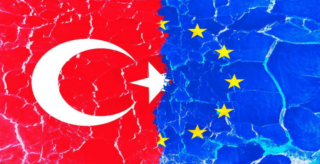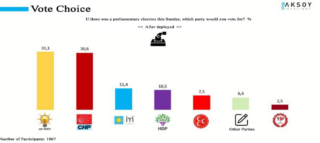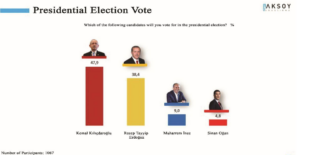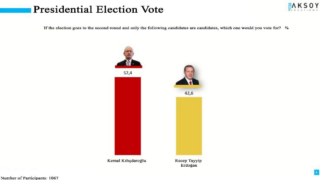
https://www.europarl.europa.eu/resources/library/images/20161128PHT53524/20161128PHT53524_original.jpg
By Uladzislau Yanovich
In less than a month, 14th May, Turkey will face one of the most crucial political upheavals of the last 20 years, the presidential election in which two main political leaders are taking part. On one side there is Recep Tayyip Erdoğan, undisputed leader, former prime minister and current president of the Turkish Republic and his political party “Justice and development party” (AKP), in Turkish “Adalet ve Kalkınma Partisi”, a conservative democratic party. Erdoğan has been receiving electoral support also from Turkish the Nationalist Movement Party (MHP), which is a Turkish far-right and nationalistic party. On the other side there is a broader and more heterogeneous coalition made of opposition parties led by Kemal Kılıçdaroğlu, Erdoğan’s main political opponent and President of the second most popular party in Turkey, the Republican People’s Party (CHP), in Turkish “Cumhuriyet Halk Partisi”. The CHP is considered a Kemalist and a social-democratic party supported by a few crucial parties such as the “Good party”, in Turkish “Iyi partesi”, a Kemalist center-right party, and “The People’s democratic party” (HDP), in Turkish Halkların Demokratik Partisi, a left wing, pro-minority Turkish party supported by the Kurdish Democratic Regions Party (DBR) and several other minor Turkish parties. At the end of 2022 they formed the so-called “Table of Six”, in Turkish Altılı Masa, with external support from the HDP to create a post Erdoğan government and promote a return towards a more Parliamentary-oriented system.
The Turkish-EU Relationship: an age-old relationship
The Presidential election represents a watershed for Turkey – the outcome will also affect the European Union’s long term political relationship with the country. This relationship started a long time ago. Turkey has played a pivotal role since the beginning of the European journey, with the foundation of the EC in 1957. In the beginning, the relationship was asymmetric since some European countries exploited Turkey, for example West Germany experienced an unprecedented economic growth thanks to Turkey’s cheap manpower. In 1963 Turkey and the EC signed an Association Agreement, which entered into force in 1964, and after that an additional protocol was added in 1970, entered into force in 1973. This protocol added free movement of goods, persons and services and a closer alignment of economic policies. In the same period, an association agreement with Greece was signed.
In the following 40 years from the agreement the EU and Turkey has become closer and closer both politically ande economically, with the turning point of Turkey being declared as a candidate country to join the European Union on December, 11th, 1999 during the Helsinki Council. In 2005 the European Council officially opened the negotiations with Turkey, and the following 10 years were characterized by ups and downs in the integration process, finally suspended because of concerns about human rights and the rule of law.
From the economic and security point of view, the European Union is a crucial partner for Turkey. The European Union is the first trade partner. In 2022, 26% of Turkish import goods came from the EU and 41% of the country’s exports entered the Union. In the security field, especially since the 2014 refugee crisis, Turkey has become a gate to European countries for millions of people seeking asylum, fleeing from the war in Afghanistan and Syria. Under pressure for the huge amount of migrants and due to the inability to quickly create a Common Immigration Policy, in 2016 the EU decided to reach an agreement with Turkey, the so-called EU-Turkey Statement or Action Plan. According to this Plan, every illegal asylum seeker arriving from Turkey would be returned to Turkey if the application for asylum was declared inadmissible; in exchange, the EU would provide Turkey with financial support. That provision helped Europe handle a very challenging situation even though it was seen as controversial by many.
The possible scenarios after the Presidential election
Turkey’s watershed is becoming more and more visible, especially in the medium and long term perspective. On the one hand, if Erdoğan and his People’s Alliance won the election, the country will lean towards a more authoritarian approach in Turkish internal politics and a huge disappointment will arise among the secular, kemalist political opposition. Erdoğan’s victory outcome could also lead to an even further complications of the relationship with Western countries and a shift towards Eastern powers (Moscow and Beijing), even though the economic links between the EU and Turkey will not let Erdoğan a wide margin of maneuver as his popularity mainly relies on economic welfare politics trade off.
From a political perspective, Turkey under Erdoğan could continue to endorse an expansive and aggressive foreign policy towards Cyprus and Greece and, in the medium-long term, this could compromise the EU-Turkish relationship. Another consequence could be the weakening of the opposition bloc and even some judicial persecution against opposition’s leaders such as Ekrem Imamoglu’s investigation from 2021 but in a more powerful and one sided way. The lack of social freedoms and right to speech together with a losened relationship with some EU member states, such as Greece and Cyprus in the Mediterranean Sea and Sweden in the North of Europe, will drive away more and more Turkish people from the democratic Western countries.
On the other side, if the opposition bloc wins, in both the Presidential and the Parliamentary elections there will be the possibility for Kemal Kılıçdaroğlu and his heterogeneous team to start a deep democratization of Turkish political system, starting from a revival of the Parliament and reassessment of the President’s role as more symbolic and diplomatic. In this case, making the judicial sector autonomous and independent should be a priority together with a greater protection of civil rights, which would help Turkey restore a good relationship with the EU and reach further integration, especially in the economic field, such as the creation of the Common Custom Union with the EU and a free movement area for Turkish citizens. Despite a predictable shift towards the Western bloc, Turkey will likely remain in a constructive relationship with Russia and other authoritarian Countries. Russia became crucial for Turkish economic and political agenda: from the economic point of view, hundreds of thousands of people escaped from Russia to Turkey and, in addition to this, Russian speaking tourists have historically been a significant amount, bringing money to Turkey.
Finally, from a political point of view both Kılıçdaroğlu’s and Erdoğan’s coalition need to solve the problem with migration from Syria, because the Turkish society is reluctant to maintain more than 4 million refugees mainly coming from Syria and Afghanistan. Therefore, it would not be a surprise to see a negotiation between Turkey and Syria – the latter supported by Russia.
Table 1.1 Aksoy Survey, Parliamentary election in Turkey, March 2023

Table 1.1 Showing the outcome of parliamentary election in Turkey on the 15th Week of 2023. Table shows two leading parties, AKP and CHP, followed by three medium parties, IYI and HDP (both 10%) supporting the opposition and MHP (7.5%) supporting the actual government
Table 1.2 Aksoy Survey, Presidential election in Turkey, first round, March 2023

Table 1.2 Represents the main candidates and their support for the incoming presidential Election in Turkey, as we can see the leading position is taken by opposition candidate Kemal Kılıçdaroğlu, in any case if nobody would reach 50% +1 then, the second round is assured.
Table 1.3 Aksoy Survey, Presidential election in Turkey, second round, March 2023

Table 1.3 Represents second round candidates, Kemal Kılıçdaroğlu has leading positions.
